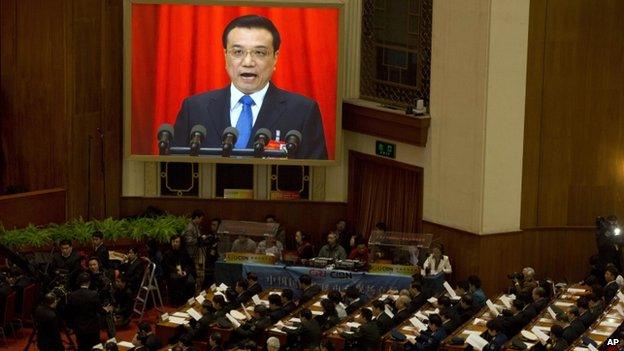Beneath the surface of China's growth plans
- Published
- comments

The Chinese Premier may not have told the whole story
On the surface, Chinese Premier Li Keqiang's speech at the annual meeting of the National People's Congress reiterates a growth target of 7.5% and inflation at 3.5%.
But there are subtle changes in emphasis that suggest that China may still be relying on credit to grow, despite the risks.
Although monetary policy was described as "prudent", a later qualification refers to achieving a "balance" between credit supply and demand.
This is essentially what I heard travelling around three provinces this week.
The demand for credit cannot be met by the banks, which are predominantly state-owned and are supposed to be prudently minding their balance sheets, given their legacy of non-performing loans. So, unofficial sources of loans are what fuel numerous private enterprises.
But officially, China is adamant that trusts and other non-banking institutions - so-called "shadow" banks - are regulated and that financial risks are controlled.
Importantly, Premier Li says deposit insurance will be established, which is very important for savers. Local governments will also be granted more leeway to issue debt, which should help reduce reliance on bank and/or "shadow" loans.
The reason for this dichotomy between what is said and what may be done is because, for China to hit its growth target, it needs to increase productivity, namely by relying on private firms.
Those reforms to increase the role of the private sector take time, especially as trimming the dominance of state-owned firms won't happen quickly.
It is easier to grow via debt. This is why the reference to monetary policy achieving a balance and pushing forward with interest rate reforms points to a perhaps unspoken willingness to allow credit to drive growth.
Ideally, the lending wouldn't come from shadow banks, but new banks. Premier Li referred to promoting the establishment of small and medium-sized banks with private capital, for instance. This again takes time.
All in all, the process of rebalancing the economy takes time. But China will be keen to meet its growth target this year, so credit looks to be the easy option.
Over the longer term, if these reforms are pursued, then they do offer part of what China needs to do in order to grow sustainably.
Premier Li said that "deep-seated problems are surfacing and painful adjustments need to be made".
The next few years could be telling for China and what emerges from this National People's Congress over the next week could be more significant than it seems on the surface.